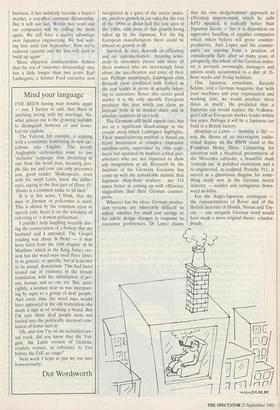Mind your language
I'VE BEEN having man trouble again — not, I hasten to add, that there is anything wrong with my marriage. No, what annoys me is the growing inability to distinguish between vir and homo. Let me explain.
The Vatican, for example, is arguing with a committee translating its new cat- echism into English. The trendy Anglophile ecclesiastics want to use 'inclusive' language, thus abolishing in one blow the word man, meaning peo- ple like me and (one can only presume) you, good reader. Shakespeare, even with his small Latin, knew the differ- ence, saying in the first part of Henry IV: 'Homo is a common name to all men.'
It is in this sense, I think, that the man in fireman or policeman is used. This is shown by the common error in speech (one hears it on the wireless) of referring to 'a woman policeman'.
I couldn't help laughing recently dur- ing the consecration of a bishop that my husband and I attended. The Gospel reading was about St Peter — it may have been from the 16th chapter of St Matthew, which in the King James ver- sion has the word man used three times in its generic, or specific, but at least not in its sexual, denotation. This had been ironed out of existence in the trendy translation, with the substitution of per- son, human and no one etc. But, quite rightly, a woman near us was interpret- ing by signs to a group of deaf people. And every time the word man would have appeared in the old translation she made a sign as of stroking a beard. But I'm sure those deaf people were not fooled into the politically incorrect con- fusion of homo and vir.
Oh, and now I'm on an ecclestico-sex- ual track, did you know that the Vul- gate, the Latin version of Genesis, renders woman, in reference to Eve before the Fall, as virago?
Next week I hope to put my toe into homosexuality.
Dot Wordsworth


























































 Previous page
Previous page